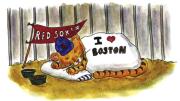The Future of Faith, by Harvey Cox, Hollis professor of divinity (HarperOne, $25.99). The retiring professor (see “Holy Cow”) reflects on the decline of dogma and formal Christianity, and the rise of a new “Age of the Spirit.”
“To Everything There Is a Season”: Pete Seeger and the Power of Song, by Allan M. Winkler ’66 (Oxford, $23.95; includes a CD). Another work about Seeger, class of ’40 (see Open Book, May-June, page 18), in his ninetieth-birthday year. Winkler, of Miami University, in Ohio, examines social protests through folk songs. Fittingly, the book opens with Seeger by the Widener steps in 1938, leafletting about the Spanish Civil War—and missing class.
The Founding Fathers Reconsidered, by Richard B. Bernstein, J.D. ’80 (Oxford, $17.95). A constitutional historian aims to “take the founding fathers down from their pedestals without knocking them down,” in that rarest of recent works in Americana: a short (176 pages) book.
Why David Sometimes Wins, by Marshall Ganz ’64, M.P.A. ’93, Ph.D. ’00 (Oxford, $35). An insider’s account of how resourcefulness trumped resources (other unions, agricultural employers) in the Cesar Chavez-era United Farm Workers; Ganz worked for the union for 16 years, becoming director of organizing. (He returned to Harvard to complete his A.B. in 1992, and is now lecturer in public policy and lecturer on social studies.)
Pink Brain, Blue Brain, by Lise Eliot ’84 (Houghton Mifflin, $24). The author—neuroscientist (Chicago Medical School), mother, and counselor—begins by observing, “Boys and girls are different,” and then guides readers to understand “how small differences grow into troublesome gaps—and what we can do about it” through play, schooling, and early life.
Empire of Illusion: The End of Literacy and the Triumph of Spectacle, by Chris Hedges, M.Div. ’83, NF ’99 (Perseus, $24.95). Are we the new Rome? The former New York Times war correspondent (see “What I Read at War,” July-August 2000, page 58) describes a society deluded by distractions (professional wrestling, pornographic films) and unable to grasp its real, pressing problems.
While We Were Sleeping: Success Stories in Injury and Violence Prevention, by David Hemenway, professor of health policy (University of California, $60; $24.95 paper). Case studies in the use of public-health disciplines to reduce risks at work and play, home or away, stemming from threats ranging from broken glass to tsunamis, and the heroes who made the difference. (See “Death by the Barrel,” September-October 2004, page 52, for more on Hemenway’s work.)
Addiction: A Disorder of Choice, by Gene M. Heyman, lecturer on psychology (Harvard, $26.95). Analyzing the spectrum of choice and motivation, the author, a researcher at McLean Hospital, concludes that addiction is neither compulsion nor disease, but rather a “disorder of choice,” yielding “less than optimal outcomes.”
Justice: What’s the Right Thing to Do? by Michael Sandel, Bass professor of government (Farrar, Straus and Giroux $25). You’ve taken the eponymous course, or perhaps seen it on video via Harvard Alumni Association club showings worldwide. Now, Sandel takes on the knotty issues of morality and markets in a book version of the course, cases and all, timed to accompany the PBS television series of the same name.
On the Loose in Boston: A Find-the-Animals Book, by Sage Stossel ’93 (Commonwealth Editions, $14.95). The Where’s Waldo? generation, or their successors with intact eyesight, will enjoy the illustrator-writer’s (Atlantic, Boston Globe, these pages) colorful romp through the North End, Faneuil Hall, the Public Garden, Fenway Park, etc., searching for the out-and-about animals who have absented themselves from Franklin Park Zoo. Not suitable for Yankees fans.








